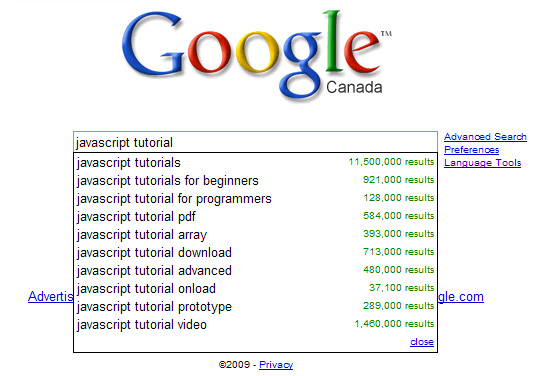
These are a mix of methods that I’ve personally used, or that I’ve considered using, so I hope you’ll find them useful. And feel free to include your own methods for generating blog post and tutorial ideas in the comments.
Although this article is specifically geared towards generating ideas for web developers, the methods discussed could also be a basis for other fields of writing.
1. High-Quality Web Development Books
This should be one of the primary ways that writers come up with ideas for articles and tutorials. Although there is a lot of inspiration for ideas online, some of the best ideas you’ll come up with will be from reading actual hardcopy books (or, I suppose, their PDF equivalents which I personally do not find as inspiring).
Books are good for idea inspiration for a couple of reasons: First, they are usually much more accurate than stuff you find online, especially considering the amount of editing that is done on them. And second, they tend to be more comprehensive than stuff you find online on the same topics.
But remember what the heading above says: “High-Quality”. The “Dummies” books, “Quickstart Guides” and other similar style of publications are generally not as good as stuff you’ll find from SitePoint, Oreilly, or New Riders.
So, before buying a book, read the reviews, and make sure it’s published by a top-quality tech book company.
2. High-Quality Web Development Blogs
While books can provide more accurate and detailed information, blogs and article websites have the advantage of more up-to-date information and news on the latest trends, events, and other happenings in the design and development world.
Keeping up with various blogs will also prevent you from spending hours writing on a topic that has been covered dozens of times already, and thus will be less likely to be accepted for publication. And if you’re just writing for your own website, a re-hashed topic will be less likely to receive traffic and comments.
This particular tip would include newsletter subscriptions, RSS feeds, and links spread through Twitter.
Partner Link: If you have a web development idea and are looking to bring it to life, call Webisoft. Specializing in working with startups, they provide the necessary expertise and guidance to transform your concept into reality. Whether it’s a simple website or a complex online platform, Webisoft’s experienced team is ready to discuss your needs and create a tailored solution that fits your vision. Don’t hesitate to reach out and take the first step toward success with Webisoft.
3. Social Media
Following and interacting with various developers on social media sites like Twitter and Facebook will allow you, in some circumstances, to get a jump on ideas and topics. If the top writers and bloggers are chatting about a specific technique, technology, or event related to your field, then you could use their chatter as a basis for an article or tutorial.
Who knows, you might even get the jump on a hot trend or topic. Often chatter among developers will eventually lead to an article or tutorial, so why not pay close attention and see if you can’t be the one who constructs that idea into an articulate piece?
4. Google’s Ajax-Based Drop-Down Search Suggestions
This is probably something you haven’t thought of, but the drop-down suggestions that appear when you do a Google search can give you an overall feel for what people are searching for online. For example, if you’re considering writing a JavaScript tutorial but aren’t sure what to cover, then you could type the term “JavaScript Tutorial” in the Google Search box and see what types of things Google suggests.
Google will often give you suggestions that have a million or more results, as well as suggestions that have only a few thousand results. Choosing a topic that has only a few thousand results would be a great idea for an article because it means it’s something people often type into Google, but does not have that many write-ups. Looking at the actual results will also help, as you’ll see if that particular issue has been covered and how in-depth that coverage is.
5. Organic Search Terms in Google Analytics
This is very similar to #4 above, but it will be even more refined and will be almost guaranteed to get results. Recently I wrote an entire article based purely on a search phrase that is used every single day to find my website.
People were typing in the phrase getElementById Explorer 7 and finding one of my pages, even though that page did not come up in the first 100 results on Google at the time. So, I deduced that they must be having such a problem with this issue, that they were searching through dozens of web pages, with little help, and eventually finding mine, which also provided little help.
So, I did a little bit of research and wrote a very straightforward article discussing some potential problems that might arise when using JavaScript’s getElementById method in Internet Explorer.
The result was great, because my article now appears in the top five results for that search phrase. I never would have bothered writing that article if it were not for seeing that search phrase come up in my Google Analytics results. I’ve never had an issue with that JavaScript method in any browser. But, as I discovered, there are some quirky issues that could arise in some circumstances, which many people were indicating by the fact that those search terms were used almost every day to find my site.
6. Client Projects
This is an easy one, because it involves practical solutions that you’re providing for a person that is paying you to do the work. Every web designer and programmer has to resolve various cross-browser issues, usability quirks, and layout challenges for a client project.
If you’ve been able to overcome a challenging issue in a standards-compliant, cross-browser fashion, then it could be the foundation for a good article, blog post, or tutorial.
7. Forums
This is another way to gauge what types of problems people are having, and how they’re resolving them, similar to the Google Analytics and Google Search-suggestion tips mentioned above. You don’t actually have to take part in the forums if you don’t want to, but reading through recent forum posts will give you a good overview of stuff people are having trouble with.
Maybe the solutions to some of their problems are not necessarily clean or in line with recent “best practices”. You could blog about that topic and provide a cleaner solution that might work in a wider range of circumstances.
8. Web Development-Related Podcasts
There are a whole slew of web development-related podcasts that can provide inspiration for a wide variety of article and tutorial ideas. SitePoint does a very informative web news podcast that I listen to once in a while. It’s not always web development stuff that SitePoint talks about, but it gives the listener a good idea of what is going on in social media, web marketing, and a variety of other areas, that could easily spark ideas for practical articles.
9. Web Development Events & Conferences
This would be a bit tougher for most, because only a few designers and developers get to participate or be in attendance at these types of events, but they can be a great source because of the quality of up-to-date information presented. And many of these events have corresponding videos or slideshows that are posted online after the events are over. So, if you miss one, then do a Google search and find out if any media is available for download on that particular event.
The recent Front-End Design Conference is a good example that could be used for inspiration. At that event, Chris Coyier of CSS-Tricks spoke about how to use jQuery to extend CSS. That idea, and possibly some of the stuff he spoke about could easily form a foundation for an interesting and practical tutorial. (He’s a nice guy, he won’t mind if you steal!)
10. Your Own Past Articles
Let’s be honest: We all cringe at the thought of reading our older stuff. And due to the fast-paced nature of the web, most of what we’ve written in the past is probably out of date — which makes us cringe even more.
Why not update one of your older articles or tutorials, making a particular technique work in the most recent browsers, or making it more in line with the latest trends or best practices? Recycling old ideas is a great way to keep your writing up to date with recent web activity, and will also force you to do the research necessary to make that particular technique or method work.
Any More Ideas?
What are some of your favourite methods of inspiration for articles, tutorials, or blog posts that are not mentioned here?











Hello..Thanks for valuable information.It seems to be great info..The ten ways are really powerful and even i was succeeded..Thank you very much…
Nice. post. thank you. very usefull.
Thanks very much, interesting read. I think it should be stressed though that people should be creative and not just post copy cat articles all over the place.
Try to make sure if you’re writing about something that is written about a lot that you have your own spin or insight on it.
Many thanks for summarising how to start ?
I was thinking of writing something on my new blog..but wasn’t sure where to start. Your article gives me needed insight on finding where to look for ideas..
thanks
Very nice and informative post on web development. I really had a great time reading this post.. keep it up and looking forward to read more soon.
Another way is Polls and Surveys, asking blog readers or newsletter subscribers can help understand their needs and write a tutorial they want to read.
Good resources. A few of them I currently use.
hi all this very to being here it was it very informative and very useful to designers and developers keep touch here..
Wow! I stumbled upon this post from Graphic Design Links and just wanted to stop by and say that #4 and #5 are AWESOME tips for ideas generation. I read soooo many blog posts every day, many of them espousing on how to create content or fill a blank page with writing. I had never considered going into my own analytics for ideas. Whether you use these tips for design or writing, they’re great tips!
Bravo!
I look at my analytic results for the past two weeks and if people are coming to my site for a certain topic I try to provide a new article on that topic.
Never considered Google Analytics before. I’ve meaning to using it, but now I have a strong motive.
Good starting step for the web developers and designer and programmers as well. An excellent source for generating different ideas for web design and development.
Nice post and g8 ideas, Thanks.
Nice Post and Greate information.
Your post is very helpful for developers & especially for beginner. I give 10 points for this article.
Good article, thanks. Personally, I often use Reddit and Quora to find inspiration for articles people would want to read.